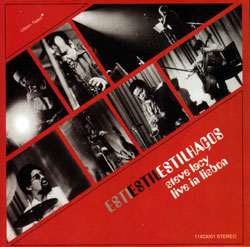
Before introducing the Steve Lacy quintet, the announcer at the start of this 1972 concert at Lisbon's Cinema Monumental claims that contemporary jazz has retaken a beautiful tradition of collective improvisation. The concert then starts with transistor radio signals unleashed by Irene Aebi, as the Lacy quintet of the period launches into its collective improvisation with a six-minute "Stations," which features voices off Portuguese air waves, and the ecstatic playing of Steve Pots' alto, Steve Lacy's chirping soprano, Kent Carter's probing bass and the cymbal splashes and drum rolls of Noel McGhie.
The rest of the session features playing on some other well-known Lacy pieces, "Chips," "Moon," "Dreams, " "No Baby" and "The High Way," Aebi adding cello and harmonica to the mix. As is often the case with Lacy concerts, judging from other live recordings, this is a very free reading of composed material and while the thematic material is predetermined, there is a pervasive feeling of spontaneity and the spirit of adventure reigns supreme.
A combination of intense free playing and whimsical punctuations of harmonica, as well as the occasional radio signal get thrown in throughout, with lots of textural variety. A prominent feature of this high energy, burning group effort, is the interesting two-saxes overlaps, and the transistor radio that provides interesting entry points for the aleatory process, something that seems central to Lacy's compositional aesthetic.
Fernando Pessoa, one of Portugal's most famous 20th century poets, claimed toward the end of his life that his country was destined to become a cultural leader, and while that may seem like hyperbole, it is clear that Portuguese label Clean Feed is stepping up and releasing some music that supports the continuing efforts of the avant guard. Even though this Lacy disc is a reissue, the music here will still give listeners (musicians and lay listeners alike) something to think about, in this era of misnamed "Jazz festivals" and in a world where jazz has become processed and stylized to the point of sterility and reductive revisionism. What this album asserts is that collective improvisation is a vital defining feature of jazz that will always be best when volatile and uncaged.
Comments and Feedback:



More Recent Reviews, Articles, and Interviews @ The Squid's Ear...


|

